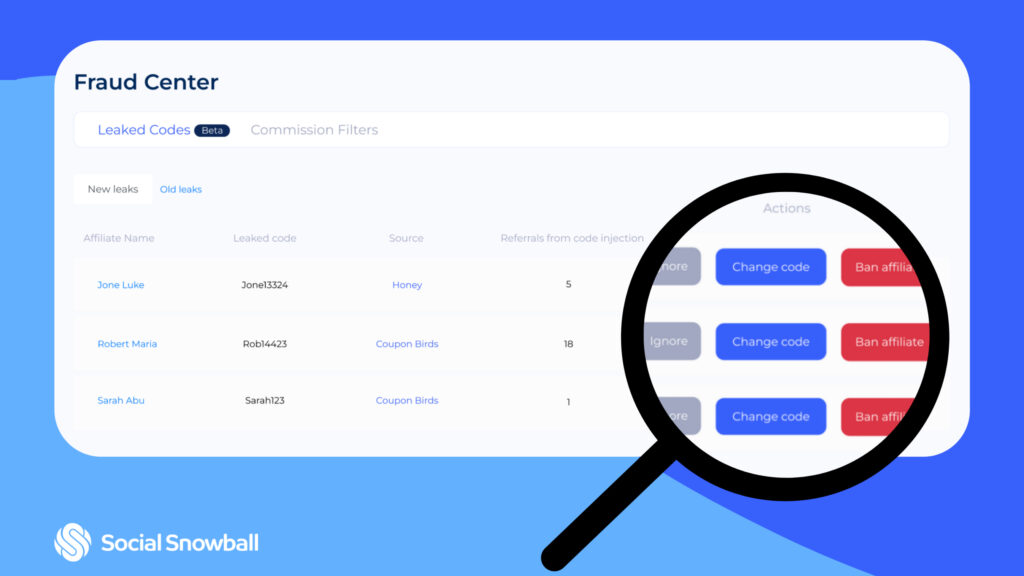Many brands have affiliate marketing programs where individuals (“affiliates”) will accept terms in order to promote the brand via a discount code or link. This is called an affiliate program. Typically programs are owned by affiliate marketers who specialize in creating and growing these programs.
In other words, legitimate affiliates partner with legitimate business affiliate program and earn commissions. For the business, it’s a marketing strategy to increase sales via affiliate networks, while for the affiliate, it’s a great way to earn passive income.
Since brands may have thousands of members join their affiliate programs, some affiliates can become dishonest about the sales they generate and commit affiliate marketing fraud within the affiliate marketing program for a company.
So, what is a bad affiliate or affiliate marketing scam? Well, it’s often referred to as ‘affiliate fraud’ in the affiliate marketing industry.
In this article, we’ll share exactly what this is, the types of affiliate fraud to look out for, and how you can prevent fraud in your affiliate marketing program.
What is Affiliate Marketing Fraud?
Affiliate fraud refers to when an affiliate intentionally engages in fraudulent activities to increase their commission earnings in an affiliate marketing program. This can include actions such as fake clicks, fake leads, and fake sales.
Fraudulent affiliates engaging in dishonest activities not only harms the companies whose products or services are being promoted, but also other affiliates who may be operating ethically. It is important for companies to have measures in place for affiliate fraud detection.
Types of Affiliate Fraud
Click Fraud
Click fraud occurs when someone clicks on an affiliate link with no intention of making a purchase. This could be done by competitors trying to sabotage an affiliate’s earnings, or by individuals who want to artificially inflate their own earnings. Click fraud can be difficult to detect and can lead to wasted advertising spend and lower earnings for legitimate affiliates.
A form of click fraud known as ad fraud occurs when a website operator generates deceitful clicks on pay-per-click (PPC) display ads hosted on their own site. Those who commit click fraud may create web pages that showcase PPC ads and then employ click bots to simulate clicks on these ads.
Cookie Stuffing
Cookie stuffing involves the use of hidden or disguised links on a website, which automatically set a cookie on the user’s computer without their knowledge.
An example of cookie stuffing in affiliate marketing fraud is when an affiliate marketer uses deceptive tactics to place affiliate tracking cookies on a user’s device, such as through pop-up ads or hidden code on a webpage. These cookies then track the user’s activity and attribute commissions to the affiliate marketer even if the user did not click on the affiliate’s links or make a purchase through their affiliate link. In some cases, the affiliate marketer may even stuff cookies on a user’s device after they have made a purchase through another affiliate’s link, thereby stealing commissions that rightfully belong to the other affiliate.
Fake Leads
Fake leads are leads that are generated fraudulently, either through the use of bots or by individuals who have no real interest in the product or service being advertised. This can lead to wasted advertising spend and lower earnings for legitimate affiliates. One example is sending bot traffic to the website through the affiliate’s link.
Ad Stacking
Ad stacking involves the placement of multiple ads within a single ad space, with the intention of deceiving advertisers into believing that multiple ads have been viewed. This can result in advertisers paying for ad impressions that were never actually viewed by users.
Brand Bidding
Brand bidding involves the use of a competitor’s trademarked brand name in order to drive traffic to an affiliate’s website. This can be done through search engine advertising or by bidding on the competitor’s brand name in an auction. This practice is often prohibited by affiliate programs and can lead to legal action.
Commission Theft
Commission theft occurs when an affiliate steals commissions that rightfully belong to another affiliate. This can be done through various means, such as by replacing another affiliate’s affiliate ID with their own, or by URL hijacking a user’s browser session. Commission theft is a serious offence and can result in legal action.
Impact on legitimate affiliates and merchants
Affiliate fraud can have a significant impact on both legitimate affiliates and merchants.
Legitimate affiliates may see a decrease in commissions or even lose their affiliate status if fraudulent activity is detected. Merchants may also suffer financial losses due to paying out commissions for fraudulent sales.
Additionally, affiliate fraud can damage a merchant’s reputation if customers are directed to fraudulent websites or if fraudulent activity is associated with their brand.
Financial losses for merchants
One of the most significant consequences of affiliate fraud is financial losses for merchants. When fraudsters engage in activities such as click fraud, cookie stuffing, or fake leads, they can drain a merchant’s budget and reduce the effectiveness of their marketing campaigns.
Merchants may have to pay for fraudulent clicks, leads or sales, which can lead to significant financial losses. Furthermore, these financial losses can impact the merchant’s ability to invest in other areas of their business, leading to a decline in growth and profitability.
Damage to reputation and trust
Affiliate fraud can cause severe damage to a merchant’s reputation and trust among customers. When fraudulent activities are detected, it can lead to negative publicity, which can harm a merchant’s brand image. Customers may lose trust in the merchant and feel hesitant to make purchases from them.
As a result, the merchant’s sales may decrease, and it may become challenging to attract new customers. The damage to reputation and trust can linger for a long time and may require significant efforts to repair.
Legal consequences for fraudsters
Fraudsters who engage in affiliate fraud may also face legal consequences. Depending on the severity of the fraud, they may be prosecuted under various laws such as the Computer Fraud and Abuse Act, the Federal Trade Commission Act, or other state-specific laws. The legal consequences can include fines, imprisonment, or both. In addition, fraudsters may face civil lawsuits from merchants seeking to recover their financial losses. The legal consequences of affiliate fraud can have long-lasting effects on the fraudster’s personal and professional life.
How to Stop Affiliate Fraud & Prevent it in the Future
Choosing reputable affiliate networks and programs
One of the best ways to protect against affiliate fraud is to choose reputable affiliate networks and programs. This means doing research to find affiliate partners that have a good track record of paying their affiliates on time and fairly. Look for networks and programs that have been in business for a while, and that have a good reputation in the industry.
You can also ask for recommendations from other affiliates, or read online reviews to get an idea of which companies to work with.
Monitoring traffic and conversions
Another important step in protecting against affiliate fraud is to monitor your traffic and conversions carefully. Keep an eye on your affiliate dashboard to make sure that you are seeing a reasonable number of clicks and conversions.
If you notice any unusual patterns or spikes in traffic, it may be a sign of fraud. You can also use analytics tools to track your traffic and conversions more closely, and to identify any unusual patterns or trends.
Implementing fraud detection tools
To further protect against affiliate fraud, it may be a good idea to implement fraud detection tools.
These can include tools that detect bots or other fraudulent activity on your site, as well as tools that monitor your affiliate links and track clicks and conversions. There are many different tools and services available, so be sure to do your research and choose the ones that are best suited to your needs.
One example of a tool is Social Snowball’s leaked discount code center. You can use this to see when an affiliate code leaks on a site like Honey or Coupon Birds.

Conducting regular audits and reviews
Finally, it is important to conduct regular audits and reviews of your affiliate program to ensure that everything is running smoothly and that there are no signs of fraud.
This can include reviewing your affiliate agreements and contracts, as well as checking your analytics and monitoring your traffic and conversions. By staying vigilant and proactive, you can detect affiliate fraud and ensure that your affiliate marketing is successful in the long term.
Conclusion
In this article, we have discussed various aspects of affiliate fraud. We have explained what affiliate fraud is, how it works, and what are the different types of affiliate fraud. We have also highlighted the impact of affiliate fraud on businesses and what measures can be taken to prevent it.
Moreover, we have discussed the importance of having a fraud prevention plan in place and how businesses can benefit from it. Importance of staying vigilant against affiliate fraud In conclusion, it is essential for businesses to stay vigilant against affiliate fraud.
Affiliate fraud can cause significant losses to businesses, damage their reputation, and affect their relationship with legitimate affiliates.
Therefore, it is crucial to take proactive measures to prevent affiliate fraud, such as monitoring affiliate activities, conducting regular audits, and using anti-fraud tools. By staying vigilant against affiliate fraud, businesses can protect their interests, maintain their reputation, and ensure that their affiliate marketing programs are successful.




